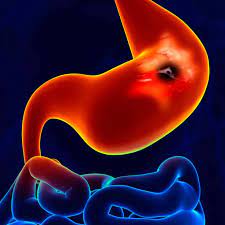Doctor Ivan Kamoga, a health expert at Gilgal Medical Centre Mbale, has defined peptic ulcers as painful sores that form in the lining of the stomach or the upper part of the small intestine (duodenum). It is a common gastrointestinal issue affecting millions worldwide.
According to Dr. Kagoma, these ulcers occur when the protective lining is damaged, exposing the area to corrosive stomach acid, which leads to ulcers. Dr. Kagoma noted that the primary culprit behind peptic ulcers is an infection caused by Helicobacter pylori (H. pylori) bacteria.
“This common bacterial infection weakens the stomach’s protective lining, allowing acid to create painful sores,” Dr. Kagoma said.
He added that the long-term use of painkillers such as aspirin, ibuprofen, and naproxen can also damage the stomach lining, contributing to ulcer formation. The doctor further stated that genetic factors, including stress and certain health conditions, can lead to increased acid production in the stomach, heightening the risk of ulcers.
“While smoking and excessive alcohol consumption do not directly cause ulcers, they can exacerbate existing conditions by irritating the stomach lining and increasing acid production,” he added.
Common Symptoms of Peptic Ulcers
Dr. Kagoma narrated that the symptoms appear with a burning or gnawing pain in the upper abdomen, often worse when the stomach is empty, which advances into bloating, burping, nausea, and an upset stomach after meals.
The medical expert added that sometimes there is unexplained weight loss, potentially due to discomfort while eating, and in severe cases, ulcers can cause bleeding, resulting in black, tarry stools or blood in vomit.
“Certain foods may worsen these symptoms, including spicy foods, fried and fatty items, acidic fruits, and caffeinated beverages,” Dr. Kamoga said.
Diagnosis of Peptic Ulcers
Medical experts explained that the diagnosis of peptic ulcers typically involves several methods, such as endoscopy, where a thin tube with a camera is inserted into the stomach to examine the lining.
They added that blood, breath, and stool tests are carried out to detect H. pylori and imaging tests such as X-rays and CT scans.
Treatment Options
Dr. Kagoma noted that treatment for peptic ulcers often begins with lifestyle changes, including reducing alcohol intake, quitting smoking, and managing stress.
“If an H. pylori infection is present, antibiotics are prescribed to eliminate the bacteria,” he noted.
He also added that proton pump inhibitors (PPIs) are commonly used to decrease stomach acid production, promoting healing, adding that antacids can provide relief from pain and discomfort but should not be taken simultaneously with other medications.
In cases where ulcers are caused by no steroidal anti-inflammatory drugs (NSAIDs), he said that it may be necessary to discontinue their use or switch to alternative pain relievers.
Dr. Kamoga advised that there are complications to watch for; while many cases of peptic ulcers can be managed effectively, complications can arise; these include bleeding, which may lead to significant blood loss, and symptoms like dizziness or anemia.
He defined perforation as a situation where the ulcer creates a hole in the stomach or intestine, requiring emergency treatment.
According to Dr. Kagoma, preventing peptic ulcers involves several proactive measures, such as limiting the long-term use of NSAIDs and using the lowest effective dose when necessary.
He called for reducing alcohol consumption, quitting smoking, and managing stress through relaxation techniques and healthy activities by maintaining a balanced diet while avoiding foods that irritate the stomach.
Dr. Kamoga advised that understanding what peptic ulcers are, their causes, symptoms, and treatment options can empower individuals to seek timely medical advice and make lifestyle changes that promote digestive health.















